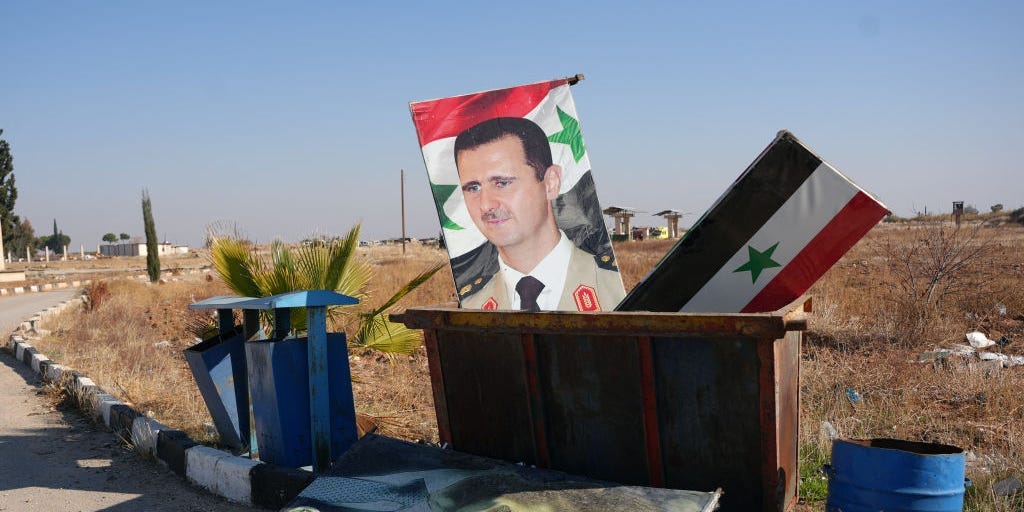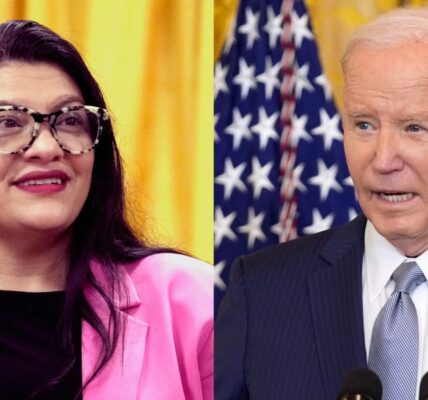- Bashar Assad has resigned his position as president and left Syria.
- Rebel forces said they seized control of Syria’s capital, Damascus.
- The collapse of Assad’s government could have major global implications.
Syrians around the world celebrated after rebels, after more than a decadelong fight, finally toppled the country’s longtime leader, Bashar Assad, on Sunday.
The Russian foreign ministry said on Sunday that Assad had resigned from his position as Syrian president and left the country. Russian state news reported that Assad had arrived in Moscow, where he’s been granted asylum.
Syrian anti-government forces announced early on Sunday morning that they had advanced into Damascus, Syria’s capital.
In a post on social media, rebel commander Hassan Abdul-Ghani said: “We declare Damascus free from the tyrant Bashar al-Assad.”
“Today 8-12-2024 Syria is officially free,” he added in a later post.
President-elect Donald Trump said on Truth Social on Sunday that Assad had “fled his country” after losing Russia’s support.
“Assad is gone,” Trump wrote. “His protector, Russia, Russia, Russia, led by Vladimir Putin, was not interested in protecting him any longer.”
In a press briefing on Sunday, President Joe Biden called the fall of Assad’s government “a fundamental act of justice” and “a moment of opportunity for the long-suffering people of Syria to build a better future for their proud country.”
Biden said the US would support Syria’s neighbors Jordan, Lebanon, Iraq, and Israel “should any threat arise from Syria during this transition.” Biden said the United States would also “maintain our mission against ISIS” inside the country, referring to the terrorist group operating in the region.
The US military conducted at least a dozen airstrikes inside Syria on Sunday, “targeting ISIS camps and ISIS operatives,” Biden said.
The United States will also support Syria through the United Nations to create a new government through a process determined by the Syrian people, Biden said.
“The United States will do whatever we can to support them, including through humanitarian relief, to help restore Syria after more than a decade of war and generational brutality by the Assad family,” Biden said.
Secretary of State Antony Blinken, in a Sunday statement, echoed the president’s sentiment, saying the US “will support international efforts to hold the Assad regime and its backers accountable for atrocities and abuses perpetrated against the Syrian people, including the use of chemical weapons and the unjust detention of civilians such as Austin Tice.”
The Syrian people, Blinken added, “finally have reason for hope.”
Kaja Kallas, the European Union’s High Representative for Foreign Affairs and Security Policy, called Assad’s resignation “a positive and long-awaited development.”
“It also shows the weakness of Assad’s backers, Russia and Iran,” Kallas said in a statement. “Our priority is to ensure security in the region. I will work with all the constructive partners in Syria and in the region.”
Geir Pedersen, the UN’s Special Envoy for Syria, said in a statement, “Today marks a watershed moment in Syria’s history.”
The coalition of rebel groups launched a surprise offensive in late November led by Hayat Tahrir al-Sham, which traces its origins to the Al Qaeda terrorist network, though has more recently promoted more moderate views.
The rebels quickly took control of Aleppo, one of Syria’s largest cities, Hama, and the strategic city of Homs, which sits at an important crossroads linking Damascus to the coast.
The collapse of Assad’s government could have significant global implications, especially for Russia and Iran, which had been two of Assad’s strongest allies.
Moscow operates two major military facilities in Syria — the Hmeimim airbase and the Tartus naval base — which have given its forces crucial access to the Mediterranean Sea and a base to launch operations into Africa.
Losing access to these bases would scupper many of Russian President Vladimir Putin’s plans in the region, Zineb Riboua, a research fellow and program manager at the Hudson Institute’s Center for Peace and Security in the Middle East, wrote on X. “Without a strong Russian military base in Syria, all of Putin’s plans collapse.”
While Russia intervened to prop up Assad in 2015, its priorities have since shifted to the war in Ukraine, and it had appeared reluctant to divert any significant resources to help Assad this time around.
Russia’s foreign ministry said on Sunday that there was currently no security threat to its military bases in Syria but that they were on high alert.
For Iran, Syria has been part of an important land corridor stretching from Tehran to Baghdad, Damascus, and Beirut, helping it support key regional proxies such as the Lebanese militant group Hezbollah.
“For Iran, Syria is absolutely essential in order to maintain its proxy network,” Natasha Hall, a senior fellow with the Middle East Program at the Center for Strategic and International Studies, previously told Business Insider.
But Tehran, too, has been distracted by its conflict with Israel, while Hezbollah has been left in disarray after Israel killed its longtime leader and wounded thousands of its fighters with exploding pagers and walkie-talkies.
In a separate post on TruthSocial on Saturday, Trump called on the United States to stay out of the situation in Syria, writing: “Syria is a mess, but is not our friend, & THE UNITED STATES SHOULD HAVE NOTHING TO DO WITH IT. THIS IS NOT OUR FIGHT. LET IT PLAY OUT. DO NOT GET INVOLVED!”
This story is being updated as the situation unfolds.




